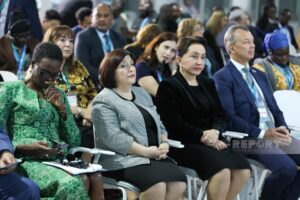The second day of the Parliamentary meeting, organized jointly by the Inter-Parliamentary Union and the Azerbaijani Parliament within the COP29, has concluded in Baku, Report informs.
A final document was adopted on the last day of the event.
Azerbaijani MP Soltan Mammadov noted that the document was prepared based on those adopted following the parliamentary sessions at COP27 and COP28, as well as discussions of the draft resolution adopted at the 148th Assembly of the Inter-Parliamentary Union, and the agenda of recent COP sessions.
“After preparing the initial version of the document, we received proposals and feedback from different countries. In June, we re-discussed the draft document at the Inter-Parliamentary Union’s preparatory meeting for COP29. The draft was again distributed to our colleagues by the Inter-Parliamentary Union secretariat. New proposals and ideas were presented. During the 149th session of the Inter-Parliamentary Union, we held very productive discussions,” said Mammadov.
He noted that all ideas, comments, and opinions were taken into account while preparing the document.
“The provisions reflected in the document are merely recommendations reflecting parliamentarians’ views. I hope we were able to present a draft that fully or partially reflects the positions of all our colleagues. You would probably agree that it’s practically impossible to compose a document that fully reflects the opinion of every member of the organization. I can only say that we tried to do our work with great responsibility and in accordance with the common goals of COP29,” he added.
The Parliamentary Meeting, organized jointly by the Inter-Parliamentary Union and the Milli Majlis as part of the 29th session of the Conference of the Parties to the UN Framework Convention on Climate Change (COP29), is continuing its work in Baku on November 17.
The event includes a session titled “Addressing climate vulnerability: promoting comprehensive and equitable approache to climate action.”
Based on insights gained on the first day regarding the real-life impacts of climate change, this session allows parliamentarians to delve deeper into how the unique vulnerabilities of different nations, such as small island states, mountainous countries, and landlocked nations, can be addressed.
The session will also feature discussions on the impact of climate change on social vulnerability among youth.
The event has drawn participation from approximately 330 representatives from 66 countries and international organizations, including over 160 members of parliament, among them 12 speakers and vice-speakers.


